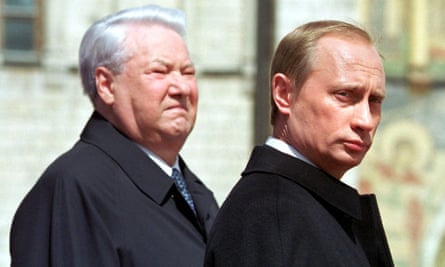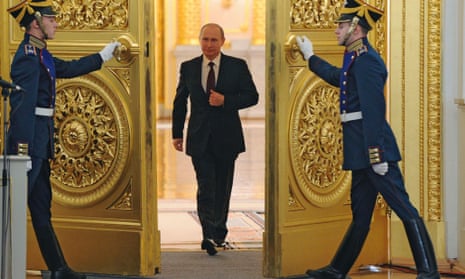Vladimir Putin’s approval rating is at record levels, with nine out of 10 Russians saying they have a positive view of their president. Putin had an approval of 87% in July, and an all-time high of 89% in June, according to Levada Centre polling.
Following a drop in popularity in 2012 and 2013, when Putin’s approval ratings dropped into the 60s, the Russian president’s popularity picked up again last year on the back of events in Ukraine.
According to separate Levada figures from June, 66% believe that western sanctions are meant to humiliate and weaken Russia, and only 5% think they are about ending the conflict in Ukraine.
Some 70% of Russians believe the country should stick to its current position on Ukraine, while 20% say it would be better to make concessions in order to avoid sanctions. 87% support the annexation of Crimea, and only 4% think that the eastern regions of Donetsk and Luhansk should return to their pre-conflict status.
However, when it comes to the economy, only 13% describe Russia’s current predicament as good, while 53% describe it as average and 31% as either bad or very poor.
With nine out of 10 Russians approving of Putin, the president’s ratings are now better than they were in 2008, at the start of the Russian-Georgian war.
They are also unusually high compared with the popularity of other world leaders. Only Angela Merkel comes anywhere near Putin, with nearly seven in 10 Germans approving of the chancellor.
How has Russia changed under Putin?
It is more than 15 years since Putin became Russia’s president. The former KGB officer was a virtual unknown when he was picked to be prime minister by Russia’s first president, Boris Yeltsin. After Yeltsin’s shock resignation on New Year’s Eve 1999 elevated Putin to the Kremlin, Putin confounded pundits again by winning the presidential election in March 2000 with 53% of the vote.

Russia faced huge problems in 2000: almost one third of Russians lived below the poverty line, Moscow was embroiled in a second brutal war in Chechnya, and Russia’s leaders had yet to come to terms with the political and economic legacy of the Soviet Union.
Putin served two terms as president (2000-08) and became prime minister between 2008-12 to get around constitutional limits restricting terms of office. In 2012, he returned to the presidency amid protests.
One explanation for Putin’s consistently high approval ratings is the state’s dominance of the media and how it shapes Russian public opinion.
As independent voices have been pushed off the airwaves, the internet has bloomed, though it too is coming under increasing government control.
Russians are the most socially engaged internet users in Europe, spending nearly 13 hours a month on Facebook and (more popular) local equivalents. As the internet has become a space for dissent, the government has cracked down on social media companies and their users.
Russians have become richer under Putin
Economic output per person has almost doubled since 2000, although the pace of growth has slowed since 2007. However, more than half of Russians (53%) still live off the state budget, either as state employees, pensioners or as benefit claimants, according to Russia analyst Ben Judah in his book The Fragile Empire.
Some became staggeringly wealthy. Russian oligarchs were hit hard by the 1998 financial crisis, but many rebuilt their fortunes under the “capitalism for friends” system created by Putin. Moscow is now home to more billionaires than any other city in the world.
This year the number of billionaires is expected to hit 88.
Poverty has fallen
When Putin came to power, 29% of the population were living below the poverty line. In 2013, this had dropped to 11%, but experts at the World Bank recently warned that poverty reduction was stalling.
The murder rate has dropped
But it remains higher than anywhere else in Europe.
Prosperity was underpinned by oil prices
The Putin years have coincided with a decade of rising oil prices. The Russian government uses oil and gas revenues to pay for half of all public spending and was banking on an oil price of $100 for its budget to break even, roughly double the current price.
Russian wealth is disproportionately dependant on natural resources. According to World Bank calculations, natural capital is 43% of overall wealth in Russia. In Australia, Canada, Norway, and New Zealand the ratio is between 8% and 13%.
The era of steady rouble-dollar exchange rates came to an abrupt end in 2014, as a result of falling oil prices and western sanctions.
The exchange rate has since improved but it remains distant from the preceding years of stability.
Russia has become one of the most corrupt countries in the world
Putin’s rule has regularly been linked to corruption, which reached extravagant heights with the Sochi Winter Olympics. A report by opposition politicians estimated that $25bn-$30bn of public money was pocketed by corrupt officials.
The migration of capital and people
The elite have moved more than $550bn out of Russia since 2008. Wealthy Russians have been voting with their money: in 2014 alone $150bn was moved out of the country. Even after Russia rebounded from the 2008 economic crisis, money continued to drain out of the country.
So far this year $52.5bn has flown out of the country.
The harsh political climate since Putin’s return to the presidency has also contributed to an increase in emigration. Net migration though remains in the black.
Methodology: the Levada surveys on the economy and approval ratings were conducted in June and July on a representative nationwide sample of urban and rural population of 1,600 people aged 18 years and older in 134 settlements of 46 regions of Russia. Margin of error is +/- 3.4% points. The survey on the economic sanctions and Ukraine asked 800 people in June. The margin of error is +/- 4.1% points.

Comments (…)
Sign in or create your Guardian account to join the discussion